-
REVIEW01-01-2016
Public actions for control of breast cancer in Brazil: integrative review
Revista Brasileira de Enfermagem. 2016;69(4):793-803
Abstract
REVIEWPublic actions for control of breast cancer in Brazil: integrative review
Revista Brasileira de Enfermagem. 2016;69(4):793-803
DOI 10.1590/0034-7167.2016690424i
Views0See moreABSTRACT
Objective:
to analyze the scientific production on “breast cancer” in the period from 2002 to 2013 and determine the public policies for screening and early diagnosis of breast cancer.
Method:
this is an integrative literature review conducted in the databases MEDLINE, LILACS, SciELO and Google Scholar. Inclusion criteria: year and period of publication; availability of the full article; publication in Brazil; and the cross-check of the keywords Breast Cancer, Primary Health Care, Screening Programs, and Early Detection of Cancer.
Results:
after analysis, four thematic categories were obtained: breast self-examination, clinical examination of breast, mammography, and factors that hinder the adherence to the screening.
Conclusion:
health professionals have deficits of knowledge on the area, indicating the need for other studies on the subject addressed and greater investment in continuing education of professionals.
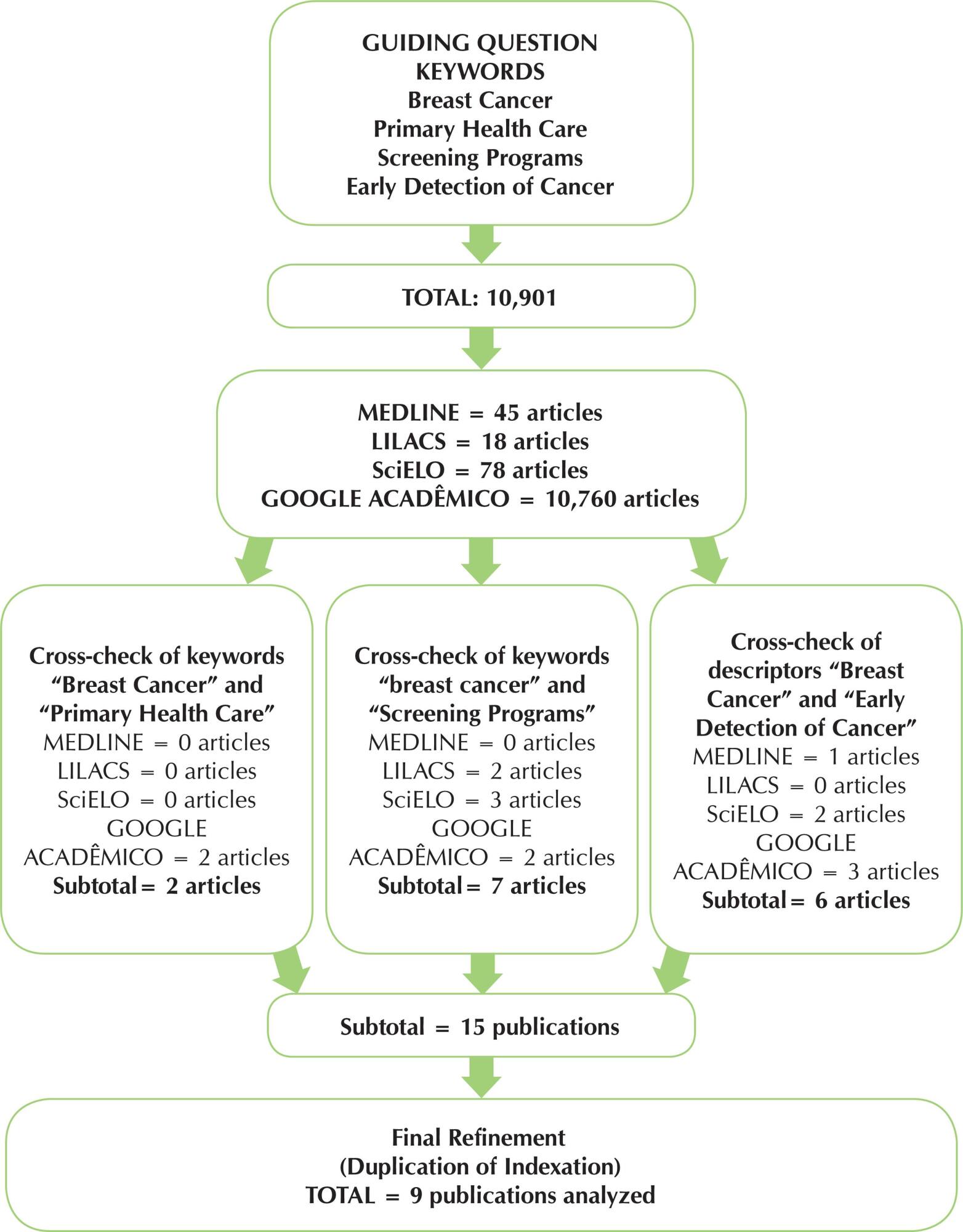
-
REVIEW01-01-2016
Nursing diagnoses in patients with cerebral vascular accident: an integrative review
Revista Brasileira de Enfermagem. 2016;69(4):785-792
Abstract
REVIEWNursing diagnoses in patients with cerebral vascular accident: an integrative review
Revista Brasileira de Enfermagem. 2016;69(4):785-792
DOI 10.1590/0034-7167.2016690423i
Views0See moreABSTRACT
Objective:
to verify the nursing diagnoses in patients affected by CVAs.
Method:
this is an integrative review of the literature. The search was conducted on LILACS, Scielo, Medline, CINAHL, and Scopus databases between February and March 2015, using the following keywords: “Enfermagem”, “Acidente Vascular Cerebral”, “Diagnóstico de Enfermagem”; and “Nursing”, “Stroke”, and “Nursing Diagnosis”.
Results:
we found 9 articles published between 2009 and 2015; most of them were Brazilian, cross-sectional, and exploratory, with a level of evidence of 6. The evidence from the publications was classified as: “Evaluation and validation of specific nursing diagnoses for subjects affected by CVAs” and “Application of the nursing process on subjects affected by CVAs”.
Conclusion:
we noticed the publications focused on nursing diagnoses related to motor disorders, such as risk of falls and impaired physical mobility. Domains regarding safety/protection (domain 11) and sleep/resting (domain 4) were present in most evaluated publications.
-
REVIEW01-01-2016
Impact of educational interventions in reducing diabetic complications: a systematic review
Revista Brasileira de Enfermagem. 2016;69(4):773-784
Abstract
REVIEWImpact of educational interventions in reducing diabetic complications: a systematic review
Revista Brasileira de Enfermagem. 2016;69(4):773-784
DOI 10.1590/0034-7167.2016690422i
Views0ABSTRACT
Objective:
To identify in the literature evidence of the effectiveness and efficacy of educational interventions in reducing metabolic and/or vascular complications in adults with diabetes mellitus.
Method:
A systematic review performed in LILACS, IBECS, CUMED, CINAHL and Medline databases and in the online library SciELO with studies published from 2004 to 2014.
Results:
Eleven studies were included (5 randomized clinical trials and 6 quasi-experimental). We only identified studies that analyzed vascular complications.
Conclusion:
Two clinical trials demonstrated efficacy in reducing cardiovascular complications, of cataract or retinopathy and nephropathy and all the quasi-experimental studies showed effectiveness in reducing feet ulcers, peripheral neuropathy and vasculopathy, and maintenance of kidney function.
Keywords:Diabetes Mellitus Type 1Diabetes Mellitus Type 2Diabetic ComplicationsEvaluation of the Efficacy-Effectiveness- of InterventionsHealth EducationSee more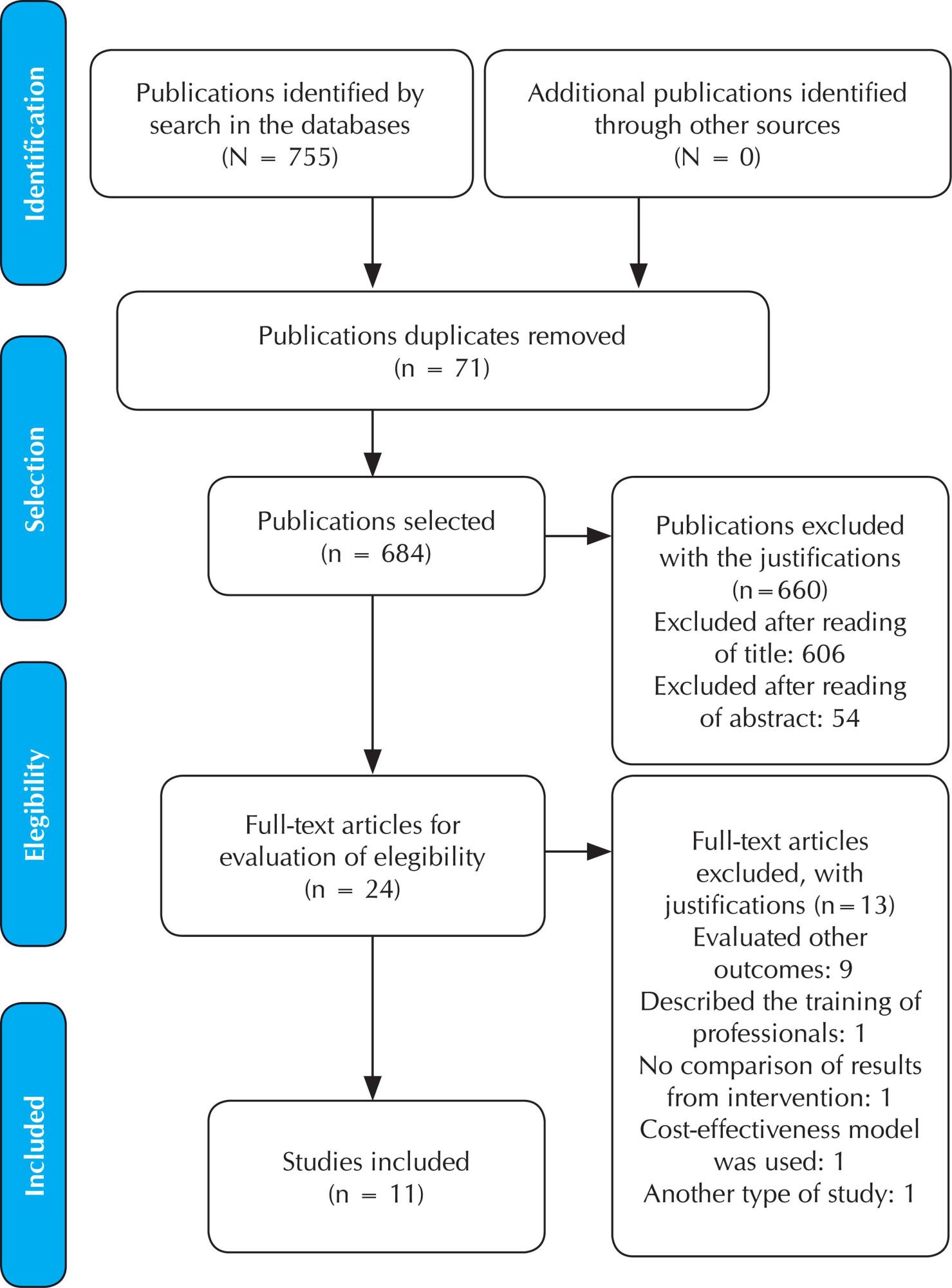
-
REVIEW01-01-2016
The communication process in Telenursing: integrative review
Revista Brasileira de Enfermagem. 2016;69(4):765-772
Abstract
REVIEWThe communication process in Telenursing: integrative review
Revista Brasileira de Enfermagem. 2016;69(4):765-772
DOI 10.1590/0034-7167.2016690421i
Views0See moreABSTRACT
Objective:
to identify scientific evidence about the communication process in Telenursing and analyze them.
Method:
integrative review performed in March 2014. The search strategy, structured with the descriptors “telenursing” and “communication”, was implemented in the databases Medline, Bireme, Cinahl, Scopus, Web of Science, Scielo, and Cochrane.
Results:
ten studies were selected after inclusion and exclusion criteria. The main challenges were: the clinical condition of patients, the possibility for inadequate communication to cause misconduct, the absence of visual references in interactions without video, and difficulty understanding nonverbal communication.
Conclusion:
distance imposes communicative barriers in all elements: sender, recipient and message; and in both ways of transmission, verbal and nonverbal. The main difficulty is to understand nonverbal communication. To properly behave in this context, nurses must receive specific training to develop abilities and communication skills.
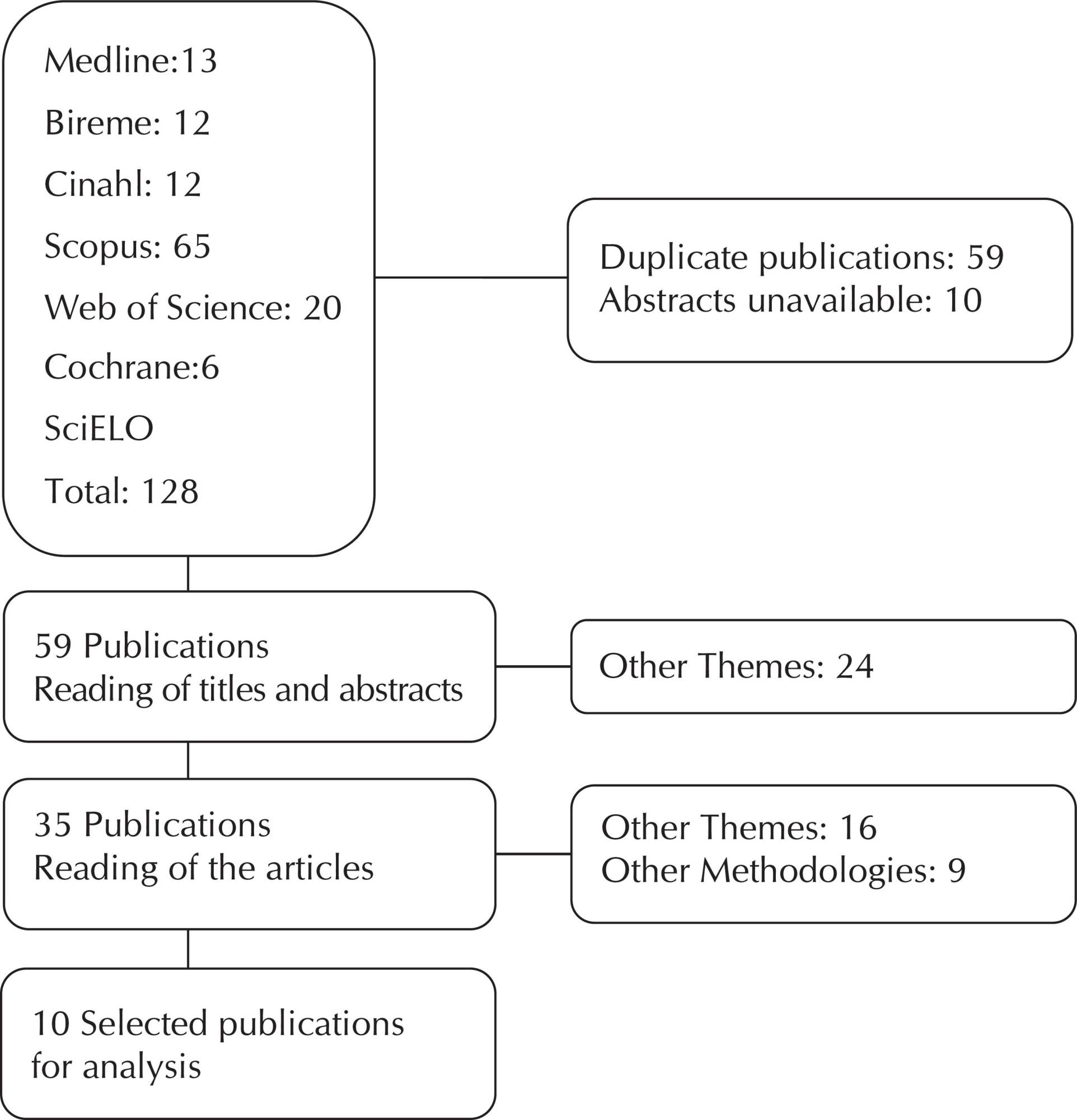
-
RESEARCH01-01-2016
Health care for patients with acute coronary syndrome according to quality indicators
Revista Brasileira de Enfermagem. 2016;69(4):757-764
Abstract
RESEARCHHealth care for patients with acute coronary syndrome according to quality indicators
Revista Brasileira de Enfermagem. 2016;69(4):757-764
DOI 10.1590/0034-7167.2016690420i
Views0ABSTRACT
Objective:
to assess in-hospital care for patients with Acute Coronary Syndrome according to quality indicators.
Method:
a longitudinal quantitative study was performed between November 2012 and March 2013 with 94 patients, including interviews and medical records.
Results:
a total of 39.4% of patients had unstable angina and 60.6% had myocardial infarction, of which 34% had ST segment elevation. Patients with TIMI and GRACE scores higher than four and 140 (p<0.05) respectively died. Admission to the intensive care unit totaled 2.1%; assessment of left ventricular (LV) ejection fraction, 83.0%; ASA within 24 hours of admission, 77.8%; statins, 72.7%; angiotensin-converting enzyme inhibitor, 62.8%; anti-smoking counseling, 53.3%; and timely reperfusion, 62.5%. Of all participants, 12.0% underwent an invasive strategy in 24h and 50.0% in 72h. Door-to-ECG time was 68.3±104.3 min and door-to-balloon time, 122±54.5 min.
Conclusions:
health care protocols are required to standardize practice and improve these indicators.
Keywords:Acute Coronary SyndromeEmergency Medical ServicesHealth Care QualityHealth Care Quality IndicatorsTreatment TimeSee more -
RESEARCH01-01-2016
Quality of working life of call-center workers
Revista Brasileira de Enfermagem. 2016;69(4):751-756
Abstract
RESEARCHQuality of working life of call-center workers
Revista Brasileira de Enfermagem. 2016;69(4):751-756
DOI 10.1590/0034-7167.2016690419i
Views0See moreABSTRACT
Objective:
to analyze the profile and quality of working life (QWL) of call-center workers.
Method:
quantitative research, conducted in one call-center of the city of São José do Rio Preto – SP, using the QVP-35 questionnaire.
Results:
profile was composed by: 80.2% women; 66.3% were single, with high school diploma and 6 hours of daily working hours; mean age of 28 years; 92.9% had only one job with mean working experience of 3 years. Positive aspects of QWL: intrinsic motivation, working ability, available resources and social support. Negative aspects of QWL: workload and organizational support.
Conclusion:
the data obtained indicate the need for better organization of call-center working processes in the company and suggests other researches in this context.
-
RESEARCH01-01-2016
Stressors perceived by patients in the immediate postoperative of cardiac surgery
Revista Brasileira de Enfermagem. 2016;69(4):741-750
Abstract
RESEARCHStressors perceived by patients in the immediate postoperative of cardiac surgery
Revista Brasileira de Enfermagem. 2016;69(4):741-750
DOI 10.1590/0034-7167.2016690418i
Views0See moreABSTRACT
Objective:
to investigate stressors perceived by patients in the immediate postoperative of cardiac surgery and their association with sociodemographic and clinical characteristics.
Method:
a prospective correlational study conducted in a city in São Paulo, between August 2013 and December 2014. A non-probabilistic sample included patients submitted to their first coronary artery bypass graft or mitral valve surgery. The “Environmental Stressor Questionnaire” adapted to Portuguese was used.
Results:
105 patients participated in the study. The item “being thirsty” was evaluated as the most stressful and “the nursing staff member does not introduce himself/herself by the name” as the least stressful. Among sociodemographic and clinical variables (gender, age, type and time of surgery, pain, intubation time, use of psychotropic medications and length of stay in the intensive care unit), only pain presented a significant association with the stressors.
Conclusion:
knowing stressors can help implement practices associated with their reduction, favoring patients’ recovery.
-
RESEARCH01-01-2016
Concepts and practices of teaching and exercise of leadership in Nursing
Revista Brasileira de Enfermagem. 2016;69(4):733-740
Abstract
RESEARCHConcepts and practices of teaching and exercise of leadership in Nursing
Revista Brasileira de Enfermagem. 2016;69(4):733-740
DOI 10.1590/0034-7167.2016690417i
Views0ABSTRACT
Objective:
to identify, describe and analyze characteristics of leadership, head nurses and participants in the teaching-learning process of leadership in Nursing, according to nurse professors who performed studies on this theme and taught such content between 1972 and 1994 in nursing schools of the state of São Paulo, southeastern Brazil.
Methods:
Thematic Oral History was used. A total of four nurse professors were interviewed, whose reports were submitted to content analysis.
Results:
the following aspects were approached in this study: the context in which students developed leadership, the influence of previous experiences on leadership qualification, its attributes, the importance of leadership, the value of teaching it, the possibilities of emancipation of a head nurse, the repercussions of teaching leadership for one’s professional life, the relationships between qualification and job market, the aspects of teaching qualification and students’ characteristics.
Conclusion:
although not essential for nursing qualification, leadership had a symbolic capital.
Keywords:Higher EducationHistory of NursingLeadershipNursing EducationResearch on Nursing ManagementSee more
-
ORIGINAL ARTICLE12-04-2023
Effect of cardiovascular biofeedback on nursing staff stress: a randomized controlled clinical trial
Revista Brasileira de Enfermagem. 2023;76(6):e20230069
Abstract
ORIGINAL ARTICLEEffect of cardiovascular biofeedback on nursing staff stress: a randomized controlled clinical trial
Revista Brasileira de Enfermagem. 2023;76(6):e20230069
DOI 10.1590/0034-7167-2023-0069
Views0See moreABSTRACT
Objective:
to assess the effect of cardiovascular biofeedback on nursing staff stress when compared to an activity without self-monitoring.
Method:
a randomized controlled clinical trial, carried out with nursing professionals from a university hospital. The intervention group (n=58) performed cardiovascular biofeedback, and the control (n=57) performed an online puzzle without self-monitoring, totaling nine meetings over three weeks. The outcome was assessed using the Stress Symptoms and Work-Related Stress scales, and the biological marker heart rate variability. The generalized estimating equations method was used.
Results:
the intervention had no effect on self-reported instruments (p>0.050). However, there was an effect of time (p<0.050) on all heart rate variability indicators, demonstrating changes over the sessions.
Conclusion:
cardiovascular biofeedback showed promising results in the biological marker, suggesting that it can be used in nursing staff as a complementary therapy by promoting better autonomic nervous system regulation.

-
Transition of Care for Individuals with Mental Disorders in Brazil: A Contextual Analysis
Revista Brasileira de Enfermagem. 2023;76(6):e20230063
Abstract
Transition of Care for Individuals with Mental Disorders in Brazil: A Contextual Analysis
Revista Brasileira de Enfermagem. 2023;76(6):e20230063
DOI 10.1590/0034-7167-2023-0063
Views0See moreABSTRACT
Objective:
To describe the contexts of care transition for individuals with mental disorders in the Brazilian setting.
Methods:
A contextual analysis was conducted through a scoping review. The search for studies was conducted in databases and thesis and dissertation portals, and the analysis was based on immediate, specific, general, and meta-contexts.
Results:
The sample, consisting of eight studies, indicated that the following factors are present in the contexts where care transition occurs: Peculiarities of care transition for individuals with mental disorders; Perspectives that can strengthen or weaken this transition; Approaches proposed in the past for the development of care transition; and Elements related to Brazilian legislation.
Final Considerations:
It is observed that the transition of care for individuals with mental disorders in Brazil takes place in various contexts of care levels. These variations present significant potentials and barriers in the care scenarios.
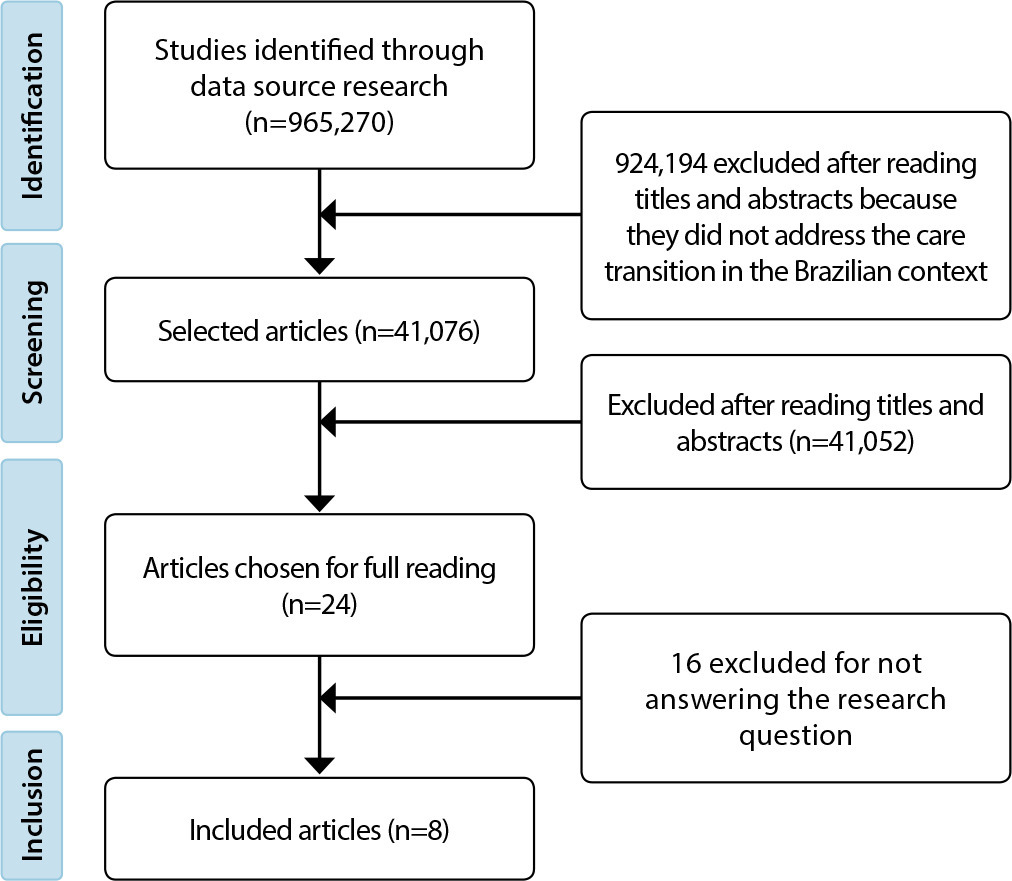
-
ORIGINAL ARTICLE12-04-2023
Feelings about birth by a group of high-risk pregnant women
Revista Brasileira de Enfermagem. 2023;76(6):e20230059
Abstract
ORIGINAL ARTICLEFeelings about birth by a group of high-risk pregnant women
Revista Brasileira de Enfermagem. 2023;76(6):e20230059
DOI 10.1590/0034-7167-2023-0059
Views0See moreABSTRACT
Objective:
to understand feelings about birth among a group of high-risk pregnant women.
Method:
a descriptive and qualitative study, using Alfred Schütz’s social phenomenology as a philosophical theoretical framework. The study included 25 pregnant women undergoing high-risk prenatal care. The interview had the following guiding questions: tell me about your feelings regarding the moment of birth/childbirth; How do you deal with the high-risk diagnosis? What are your expectations for birth/childbirth?
Results:
five categories emerged: Fear of obstetric care; Fear of complications with the baby; Fear of cesarean section; Resilience in the face of high-risk pregnancy; and Expectations for birth.
Considerations:
high-risk pregnant women are afraid of the care they will receive, the risks and concern about the baby’s vitality at birth. The importance of care is emphasized, with a welcoming environment, bonding and communication between health team and pregnant woman.
-
ORIGINAL ARTICLE12-04-2023
Sobrecarga entre cuidadores cônjuges e não cônjuges de idosos dependentes por AVC: estudo longitudinal
Revista Brasileira de Enfermagem. 2023;76(6):e20230052
Abstract
ORIGINAL ARTICLESobrecarga entre cuidadores cônjuges e não cônjuges de idosos dependentes por AVC: estudo longitudinal
Revista Brasileira de Enfermagem. 2023;76(6):e20230052
DOI 10.1590/0034-7167-2023-0052
Views0See moreRESUMEN
Objetivo:
evaluar la carga de los cuidadores conyugales y no conyugales de ancianos con dependencia inducida por ictus después del alta de la Unidad de Atención Especializada en Ictus de un hospital del sur de Brasil.
Métodos:
una encuesta longitudinal, con 48 cuidadores (20 cónyuges). Datos fueron recolectados entre mayo/2016 y julio/2018. Una semana después del alta, se aplicó la Medida de Independencia Funcional a los ancianos y la Caregiver Burden Scale a los cuidadores. Los datos se analizaron mediante análisis multivariado de varianza.
Resultados:
en tiempo 1, los cónyuges experimentaron mayor carga en relación al aislamiento social (p=0,01). Los cónyuges sintieron una tensión general y sensación de aislamiento mucho mayor (p=0,01; p=0,04).
Conclusión:
las diferencias estadísticamente significativas en la carga a lo largo del tiempo resaltan la importancia de evaluar la carga del cuidador después del alta y la necesidad de un programa de apoyo formal.
-
ORIGINAL ARTICLE12-04-2023
A longitudinal study of burden among spouse and non-spouse caregivers of older adults with stroke-induced-dependency
Revista Brasileira de Enfermagem. 2023;76(6):e20230052
Abstract
ORIGINAL ARTICLEA longitudinal study of burden among spouse and non-spouse caregivers of older adults with stroke-induced-dependency
Revista Brasileira de Enfermagem. 2023;76(6):e20230052
DOI 10.1590/0034-7167-2023-0052
Views0See moreABSTRACT
Objective:
to assess the burden of spouse and non-spouse caregivers of older adults with stroke-induced-dependency after discharge from a university hospital’s Specialized Care Stroke Unit in southern Brazil.
Methods:
a longitudinal survey. The sample consisted of 48 consenting caregivers, among which 20 were spouse caregivers. Data were collected between May 2016 and July 2018. One week after discharge, caregivers completed a sociodemographic profile, the Functional Independence Measure, and the Caregiver Burden Scale. Burden was also measured two months after discharge. Data were analyzed using Multivariate Analyses of Variance.
Results:
regarding time 1, non-spouse caregivers experienced greater burden with respect to social isolation (p = .01). Along with a persistently greater sense of isolation (p=.04), non-spouse caregivers felt far greater general strain (p =.01).
Conclusion:
statistically significant differences in burden over time highlight the importance of assessing caregiver burden after discharge and the need for a formal support program.
-
Simulation training of caregivers at hospital discharge of patients with chronic diseases: an integrative review
Revista Brasileira de Enfermagem. 2023;76(6):e20230043
Abstract
Simulation training of caregivers at hospital discharge of patients with chronic diseases: an integrative review
Revista Brasileira de Enfermagem. 2023;76(6):e20230043
DOI 10.1590/0034-7167-2023-0043
Views0See moreABSTRACT
Objective:
to identify evidence about the use and effects of clinical simulation for preparing caregivers for discharging patients with chronic conditions.
Methods:
an integrative peer review in the Scopus, PubMed, Web of Science, Cumulative Index to Nursing and Allied Health Literature, ScienceDirect and Virtual Health Library databases, from July to September 2022.
Results:
3,218 studies were identified, with a final sample consisting of four national and two international articles. Using simulation as an educational technology contributed to caregiver preparation in home care. In most studies, using clinical simulation included using other strategies to complement training: expository dialogued class, conversation circle and audiovisual resources.
Final considerations:
simulation proved to be efficient for training caregivers, with the active participation of family members and nurses in health education actions.
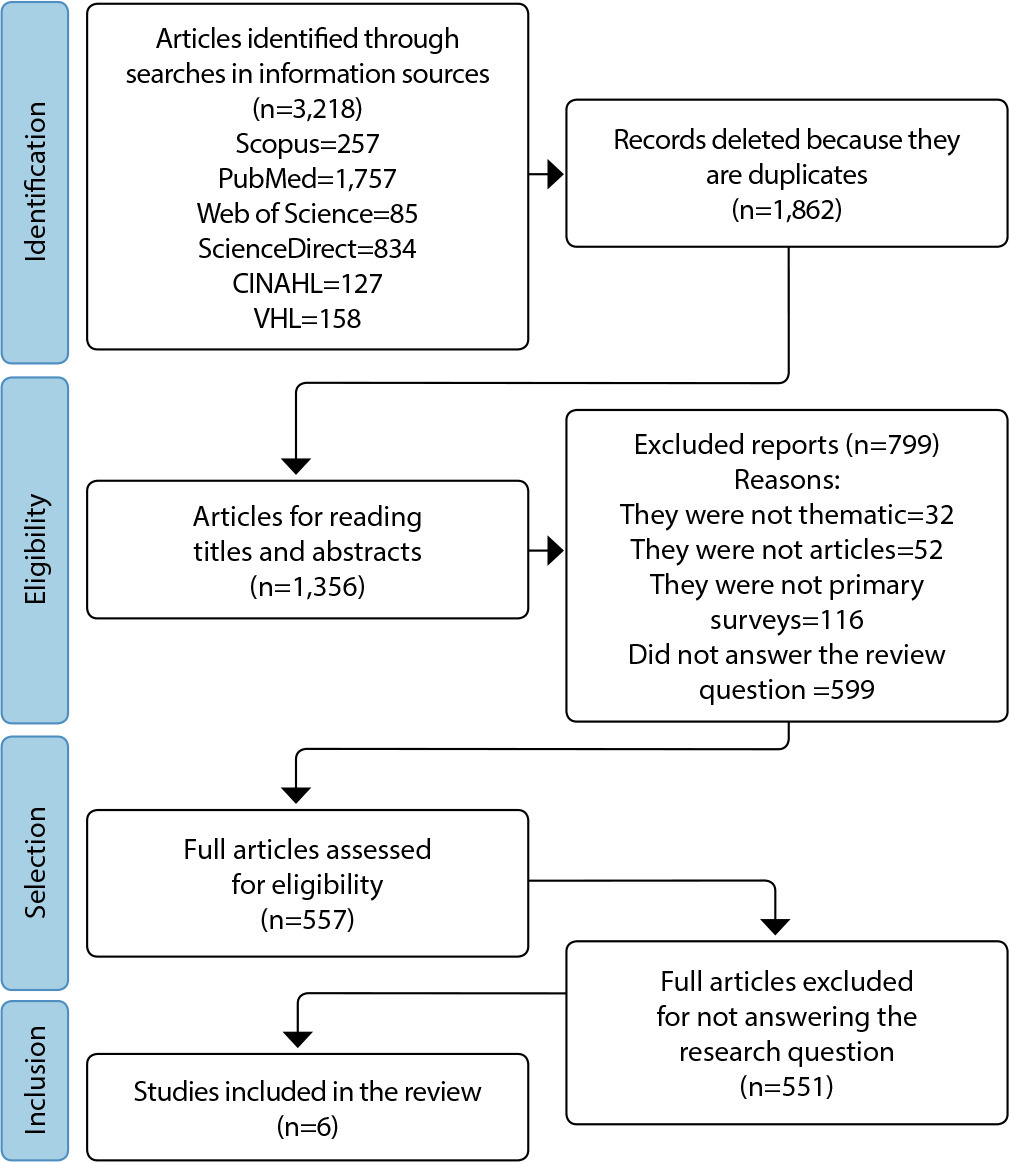
-
ORIGINAL ARTICLE12-04-2023
Alterações na composição corporal de pacientes queimados durante as fases de resposta ao trauma
Revista Brasileira de Enfermagem. 2023;76(6):e20230039
Abstract
ORIGINAL ARTICLEAlterações na composição corporal de pacientes queimados durante as fases de resposta ao trauma
Revista Brasileira de Enfermagem. 2023;76(6):e20230039
DOI 10.1590/0034-7167-2023-0039
Views0RESUMEN
Objetivo:
evaluar alteraciones en la composición corporal de pacientes quemados mediante bioimpedancia eléctrica en las fases de respuesta al trauma.
Métodos:
estudio observacional longitudinal, realizado de octubre de 2019 a marzo de 2020. Se recogieron datos sociodemográficos, clínicos, epidemiológicos, antropométricos y de composición corporal. El análisis estadístico se realizó mediante SPSS, considerando una significancia del 5%. La comparación entre variables se realizó mediante la prueba de la t de Student pareada.
Resultados:
la muestra estuvo compuesta por 58 pacientes adultos quemados, con una edad media de 38,2±12,5 años. El área de superficie corporal media (ASC) con quemaduras fue de 10,8±7,3%. La evaluación nutricional mostró disminución del peso corporal, índice de masa corporal, masa magra y masa muscular en las fases de respuesta al trauma (p<0,005).
Conclusión:
los cambios metabólicos en las diferentes fases de la respuesta metabólica al trauma llevaron a la disminución del estado nutricional de los pacientes quemados de ambos sexos durante la hospitalización.
Keywords:Avaliação NutricionalComposição CorporalEstado NutricionalImpedância BioelétricaQueimadurasSee more -
ORIGINAL ARTICLE12-04-2023
Changes in body composition of burn patients during the phases of response to trauma
Revista Brasileira de Enfermagem. 2023;76(6):e20230039
Abstract
ORIGINAL ARTICLEChanges in body composition of burn patients during the phases of response to trauma
Revista Brasileira de Enfermagem. 2023;76(6):e20230039
DOI 10.1590/0034-7167-2023-0039
Views0See moreABSTRACT
Objective:
To assess the changes in body composition of burn patients through electrical bioimpedance in the phases of response to trauma.
Methods:
a longitudinal observational study, carried out from October 2019 to March 2020. Sociodemographic, clinical, epidemiological, anthropometric and body composition data were collected. Statistical analysis was performed with SPSS, considering a significance of 5%. The comparison between variables was performed using the paired Student’s t test.
Results:
the sample consisted of 58 adult burn patients, with a mean age of 38.2±12.5 years. The mean body surface area (BSA) with burns was 10.8±7.3%. Nutritional assessment demonstrated a depletion of body weight, Body Mass Index, fat-free mass and muscle mass in the phases of response to trauma (p<0.005).
Conclusion:
metabolic alterations in the different phases of the metabolic response to trauma led to a depletion of the nutritional status of burn patients of both sexes during hospitalization.
-
EDITORIAL08-19-2024
Sexual abuse, abortion and public health in Brazil: when moral judgment accentuates inequities
Revista Brasileira de Enfermagem. 2024;77:e77suppl0401
Abstract
EDITORIALSexual abuse, abortion and public health in Brazil: when moral judgment accentuates inequities
Revista Brasileira de Enfermagem. 2024;77:e77suppl0401
DOI 10.1590/0034-7167.202477suppl0401
Views0Here is an academic-political editorial that aims to call on the scientific field to reflect on the dangers of decisions regarding the right to abortion under moral rules, since there is no evidence that such a perspective translates into practices of care, protection of childhood and gender equity – elements that are so urgent and […]See more -
ORIGINAL ARTICLE08-19-2024
The use of individual tracking programs in public health: a bioethics dilemma
Revista Brasileira de Enfermagem. 2024;77:e20230041
Abstract
ORIGINAL ARTICLEThe use of individual tracking programs in public health: a bioethics dilemma
Revista Brasileira de Enfermagem. 2024;77:e20230041
DOI 10.1590/0034-7167-2023-0041
Views0See moreABSTRACT
Objective:
to understand the bioethical perspectives on mobile tracking device use.
Methods:
theoretical study based on action research, carried out with eight graduate students from a public university. A focus group was used, with a thematic content analysis methodology with a codebook structure, approved by the Research Ethics Committee.
Results:
from the analysis, there was a concern about using devices after the pandemic ended. Using or not the device, rights inherent to humans, legislation and effectiveness of methods deepen interpretations, moving participants from a personalistic conception of the topic to a vision focused on professional implications about the methods.
Final considerations:
the debate on the impact of using technological devices on health, especially those that imply restriction of rights that refer to individuals’ private life, involves a discussion of a professional nature, in addition to requirement for clear rules on the topic.
-
ORIGINAL ARTICLE08-19-2024
Bioethical issues in the family health strategy: Considerations for nursing care management
Revista Brasileira de Enfermagem. 2024;77:e20220818
Abstract
ORIGINAL ARTICLEBioethical issues in the family health strategy: Considerations for nursing care management
Revista Brasileira de Enfermagem. 2024;77:e20220818
DOI 10.1590/0034-7167-2022-0818
Views0See moreABSTRACT
Objective:
To understand the bioethical issues involved in the care management of nurses working in the Family Health Strategy.
Method:
A qualitative study was conducted through five focus groups with 36 nurses selected in the sample. Thematic content analysis was performed based on the bioethical framework, and the synthesis was presented in a conceptual map.
Results:
Bioethical issues were identified in the nursing care practice, related to both specific bioethical themes and the peculiarities of the work. Additionally, challenges and facilitators that interfere with addressing these issues were identified.
Final considerations:
Understanding the bioethical issues involved in the care management of nurses was possible with the theoretical support of different bioethical perspectives. The identified issues relate to persistent and current themes in the field of bioethics. However, some aspects intrinsic to daily practice are still imperceptible to professionals, contributing to the difficulty of discussing bioethics in this care model.

-
REVIEW07-29-2024
Telenursing in the postoperative period: a scoping review
Revista Brasileira de Enfermagem. 2024;77(3):e20240066
Abstract
REVIEWTelenursing in the postoperative period: a scoping review
Revista Brasileira de Enfermagem. 2024;77(3):e20240066
DOI 10.1590/0034-7167-2024-0066
Views0See moreABSTRACT
Objectives:
to map available evidence on telenursing use in the postoperative period and its impact on patient outcomes.
Methods:
a scoping review, conducted according to the JBI model and the PRISMA-ScR checklist. The search was carried out in the CINAHL, Embase, LILACS, PubMed, Web of Science, SciELO, Scopus and Cochrane Library databases.
Results:
twelve studies were included, published between 2011 and 2023, 66.6% of which were in developed countries. Of the positive outcomes, we highlight improved levels of disability, autonomy and quality of life, lower rates of post-operative complications, pain and reduced costs. Telephone monitoring was the most widely used modality, but there were few studies in the pediatric context and in Brazil.
Conclusions:
of the studies, 11 (91.6%) identified at least one positive outcome in telenursing use and none showed negative aspects in the postoperative period. The role of nurses in digital health needs further study.

-
ORIGINAL ARTICLE07-29-2024
Men’s perception of paternal parenthood and the promotion of child development
Revista Brasileira de Enfermagem. 2024;77(3):e20230514
Abstract
ORIGINAL ARTICLEMen’s perception of paternal parenthood and the promotion of child development
Revista Brasileira de Enfermagem. 2024;77(3):e20230514
DOI 10.1590/0034-7167-2023-0514
Views0See moreABSTRACT
Objectives:
to comprehend men’s perception of paternal parenthood while caring for infants to promote child development.
Methods:
this qualitative study adopts an exploratory approach and was conducted with undergraduate and graduate students, faculty, and staff who are fathers of infants up to 6 months old from a higher education institution, excluding fathers from mononuclear families. Data collection occurred through semi-structured interviews and was analyzed using thematic categorical analysis.
Results:
fifteen men participated in the study. From the analysis, two empirical categories emerged: “Perception of being a father: challenges and novelties” and “Promotion of child development: actions carried out by fathers”. Fathers revealed feeling unprepared, the need for emotional support, and recognized activities aimed at their children’s development.
Final Considerations:
the relevance of the paternal figure for child development is highlighted, as well as the need for public policies to encourage paternal parenthood.
-
ORIGINAL ARTICLE07-29-2024
Contribution of informal caregivers to self-care in individuals with heart failure
Revista Brasileira de Enfermagem. 2024;77(3):e20230492
Abstract
ORIGINAL ARTICLEContribution of informal caregivers to self-care in individuals with heart failure
Revista Brasileira de Enfermagem. 2024;77(3):e20230492
DOI 10.1590/0034-7167-2023-0492
Views0See moreABSTRACT
Objectives:
to evaluate the contribution of informal caregivers to the self-care of individuals with heart failure.
Methods:
a cross-sectional study was conducted with 87 caregivers from March to October 2022 in the city of João Pessoa/PB. The caregivers’ contribution was assessed using the Caregiver Contribution to Self-Care of Heart Failure Index instrument. Scores ≥ 70 points indicate adequate contribution. Data were analyzed using descriptive statistics and Spearman’s correlation.
Results:
the sample consisted of 81.6% female caregivers. Median scores obtained for the self-care contribution scales were: 63.3 for maintenance; 55.5 for management; and 66.6 for confidence. Caregivers never or rarely recommended monitoring body weight, regular physical exercise, extra use of diuretics, and fluid restriction.
Conclusions:
informal caregivers showed inadequate contribution in the areas of maintenance, management, and confidence in self-care of individuals with heart failure.
-
Reflections on theoretical framework use in nursing research
Revista Brasileira de Enfermagem. 2024;77(3):e20230486
Abstract
Reflections on theoretical framework use in nursing research
Revista Brasileira de Enfermagem. 2024;77(3):e20230486
DOI 10.1590/0034-7167-2024-0486
Views0See moreABSTRACT
Objectives:
to reflect on theoretical framework use in nursing research.
Methods:
a theoretical-reflexive study, based on concepts and constructs pertinent to using nursing theories and other sciences, considering issues of epistemology or philosophy of science.
Results:
we presented what it is and why to do nursing research and what a theoretical framework is and why to use it, in addition to some considerations regarding theoretical framework use in nursing research, essential for constructing disciplinary knowledge, which enables the materialization of researchers’ work and the presentation of propositions resulting from investigations in and for nursing as a discipline and science.
Final Considerations:
based on a reflection based on epistemological conceptions, it is possible to affirm that a theoretical framework is the core of researchers’ thinking, delimiting a problem to be investigated and, based on it, outlining methodological strategies to be followed, supporting nursing action and thinking as discipline and science.

-
REVIEW07-29-2024
Nursing diagnoses for people hospitalized with heart failure: an integrative review
Revista Brasileira de Enfermagem. 2024;77(3):e20230471
Abstract
REVIEWNursing diagnoses for people hospitalized with heart failure: an integrative review
Revista Brasileira de Enfermagem. 2024;77(3):e20230471
DOI 10.1590/0034-7167-2023-0471
Views0See moreABSTRACT
Objectives:
to identify in the literature the main nursing diagnoses according to the NANDA-I diagnostic classification for people hospitalized with heart failure.
Methods:
an integrative literature review, carried out in February 2019 and updated in July 2023, in the MEDLINE via PubMed, LILACS, SciELO and CINAHL databases. Given the use of acronym PEO, studies without a time cut in Portuguese, English and Spanish were included. Descriptive analysis was carried out to present the identified information.
Results:
analysis of 27 articles identified 24 nursing diagnoses, with emphasis on Decreased Cardiac Output, Excessive Fluid Volume, Decreased Activity Tolerance and Fatigue.
Final Considerations:
evidence can contribute to better diagnostic decisions centered on people with heart failure in search of more assertive health results and have the potential to support future studies on a possible syndromic pattern in this population.

Search
Search in:
Nuvem de Tags
Aged (144) Atenção Primária à Saúde (239) COVID-19 (104) Cuidados de Enfermagem (269) Educação em Enfermagem (151) Educação em Saúde (139) Enfermagem (930) Estudos de Validação (131) Health Education (144) Idoso (208) Mental Health (149) Nursing (987) Nursing Care (306) Patient Safety (151) Primary Health Care (284) Qualidade de Vida (104) Quality of Life (106) Saúde Mental (145) Segurança do Paciente (150) Validation Studies (108)



